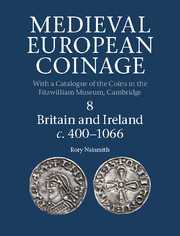Book contents
- Frontmatter
- Contents
- List of plates
- List of figures
- List of maps
- List of tables
- Preface
- Note on spelling
- List of abbreviations
- 1 Introduction
- 2 From Roman Britain To Anglo-Saxon England
- 3 Early Anglo-Saxon Gold Coinage
- 4 The Early Silver Pennies
- 5 The Kingdom Of Northumbria
- 6 The ‘Mercian Supremacy’ In The Age Of Offa And Coenwulf
- 7 The Rise Of Wessex In Southern England
- 8 The Reign Of Alfred The Great
- 9 England From Edward The Elder To Edgar's Reform
- 10 The Late Anglo-Saxon Coinage
- 11 The Anglo-Viking Coinages
- 12 Wales And Scotland
- 13 The Isle Of Man And ‘Irish Sea’ Coinages
- 14 Ireland To 1170 (with Andrew Woods)
- APPENDICES
- Bibliography
- CATALOGUE
- Concordances
- Indexes
9 - England From Edward The Elder To Edgar's Reform
Published online by Cambridge University Press: 11 May 2017
- Frontmatter
- Contents
- List of plates
- List of figures
- List of maps
- List of tables
- Preface
- Note on spelling
- List of abbreviations
- 1 Introduction
- 2 From Roman Britain To Anglo-Saxon England
- 3 Early Anglo-Saxon Gold Coinage
- 4 The Early Silver Pennies
- 5 The Kingdom Of Northumbria
- 6 The ‘Mercian Supremacy’ In The Age Of Offa And Coenwulf
- 7 The Rise Of Wessex In Southern England
- 8 The Reign Of Alfred The Great
- 9 England From Edward The Elder To Edgar's Reform
- 10 The Late Anglo-Saxon Coinage
- 11 The Anglo-Viking Coinages
- 12 Wales And Scotland
- 13 The Isle Of Man And ‘Irish Sea’ Coinages
- 14 Ireland To 1170 (with Andrew Woods)
- APPENDICES
- Bibliography
- CATALOGUE
- Concordances
- Indexes
Summary
HISTORICAL INTRODUCTION
The political transformation of England which had begun in the time of Alfred continued during the reigns of his heirs across the tenth century, with the four separate and distinct kingdoms of 865 coalescing into a single new unit which approximated modern England in its extent (for narrative accounts of this process see Stenton 1971, 320–72; Stafford 1989; Keynes 1999b; Molyneaux 2015, 25–38), although the status and extent of English authority beyond Yorkshire and Lancashire remained debatable (Molyneaux 2015, 5–9) (Map 4). The royal succession stayed within the same immediate family throughout (see Table 13): Alfred's son Edward the Elder (899–924) passed the kingdom to his son Æthelstan (924–39) (for whom see Higham and Hill 2001 and Foot 2011 respectively). Æthelstan produced no children of his own, and instead passed power on to his two younger half-brothers, Edmund (939–46) (Dumville 1992, 173–84; cf. Williams 1979) and Eadred (946–55). The latter also never married or produced heirs (and indeed was incapacitated by illness towards the end of his life: Keynes 1994a), so the throne passed to Edmund's two sons, Eadwig (955–9) and Edgar (959–75) (for the latter see Scragg 2008). The geographical heart of the emergent kingdom of England continued to be the south, and above all ‘old’ Wessex in the south-west: it was there that the king still spent most of his time and held his greatest concentration of land (Hill 1981, 85–91, 101; Roach 2013a, 77–103). Western Mercia (the modern west midlands) was also an area of well-established aristocratic power, whose magnates remembered the region's former identity as a separate kingdom; they were capable of making their wishes felt at court and even of nominating rival candidates to the throne from the ruling dynasty (Williams 1982).
- Type
- Chapter
- Information
- Medieval European Coinage , pp. 174 - 210Publisher: Cambridge University PressPrint publication year: 2017



